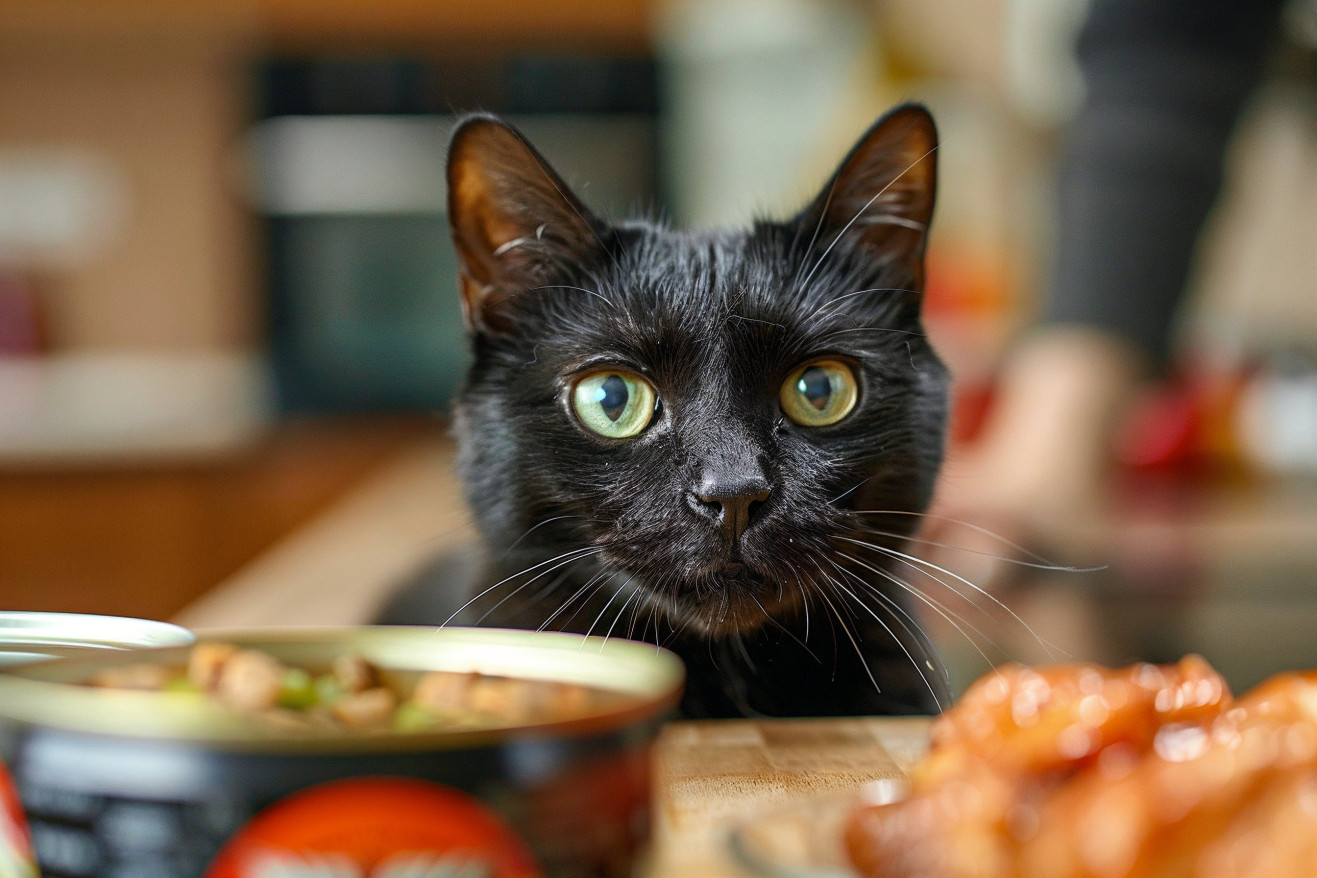Can Cats Eat Canned Chicken? A Vet's Guide to Safe Treats
16 April 2024 • Updated 16 April 2024

If you're thinking about giving your cat some of your canned chicken, you're in luck. Canned chicken is one of the human foods that cats can eat, but it should only be given to them as an occasional treat. This is because cats are obligate carnivores, which means they need a diet that includes the essential nutrients that are only found in commercial cat food.
In this article, we'll answer the question, "Can cats eat canned chicken?" by looking at the scientific evidence provided by veterinary nutritionists and other experts in feline health and nutrition. We'll cover what cats need in their diet, the dangers of feeding cats the wrong food, and how to make sure you're giving your cat human foods safely. By the end, you'll know exactly how to make sure your cat is eating a well-balanced diet that supports their health.
Can cats eat canned chicken?
Cat Nutritional Needs and the Importance of a Balanced Diet
Cats are obligate carnivores, which means their nutritional needs are very different from those of humans and other animals. They require a diet that includes high-quality protein, essential amino acids like taurine, and the right balance of vitamins and minerals that are specific to their species.
Not meeting these needs can have dire consequences. According to WebMD, a diet that doesn't meet a cat's nutritional needs can lead to muscle atrophy, skin and coat issues, organ failure, and other health problems.
Commercial cat food is formulated to meet all of a cat's nutritional needs, including the need for complete and balanced nutrition. This means that the food has the right balance of proteins, fats, carbohydrates, vitamins, and minerals that cats require to be healthy.
While a treat like canned chicken can be a fun addition to a cat's diet, it should never replace the balanced nutrition that a cat gets from their regular food. Many human foods don't have the right balance of nutrients, and if a cat eats too much of them, they can end up with a nutritional deficiency. By understanding what your cat needs and making sure they get it through a balanced diet, you can help ensure that they live a long and healthy life.
Risks and Concerns of Feeding Canned Chicken to Cats
Although canned chicken can be a safe and healthy treat for cats, there are some risks and concerns to consider before feeding it to your pet. According to Catster, canned chicken can be high in sodium, which can be dangerous for cats if they consume too much. In addition, some canned chicken products contain additives, preservatives, or seasonings that are not safe for cats.
Another potential issue is that canned chicken is high in calories, so if cats eat too much of it, they may become overweight or obese. According to PetFoodMark, the smell of canned chicken can be so appealing that cats may overeat, which can lead to weight gain.
However, the biggest concern is that canned chicken does not contain the nutrients cats need to stay healthy. For example, canned chicken does not contain taurine, an amino acid that is essential for cats and must be obtained through their diet. According to JustAnswer, if cats eat too much canned chicken, they may develop a taurine deficiency, which can lead to a variety of health problems.
Although feeding cats canned chicken as an occasional treat is generally safe, it's important to be aware of these risks and make sure that canned chicken doesn't make up a large part of your cat's diet. After all, a balanced, nutritious diet is key to ensuring that your cat stays healthy and happy for years to come.
Precautions to Take When Feeding Your Cat Canned Chicken
If you're thinking about giving your cat canned chicken, it's important to talk to your vet before you do so. As noted by Catster, your vet can help you with any major dietary changes to make sure your cat's nutritional needs are being met.
When buying canned chicken, make sure to check the label and buy a product with the fewest additives and lowest sodium levels. PetFoodMark even suggests rinsing the chicken with water to get rid of any extra salt or preservatives before feeding it to your cat to further minimize the risks.
Feed your cat canned chicken slowly and in small amounts and watch for any negative side effects. Make sure to control the portion size to avoid overfeeding, which can lead to obesity and an unbalanced diet. As mentioned by JustAnswer, canned chicken should never be used as a replacement for your cat's regular diet of commercial cat food that's complete and balanced.
If you follow these precautions, you can occasionally feed your cat canned chicken as a treat while still keeping your cat's health and wellness in mind. However, it's important to remember the potential risks of feeding your cat cooked chicken bones.
The Risks of Giving Cats Cooked Chicken Bones
Cooked chicken bones are dangerous for cats and should not be given to them. As Catster explains, cooked bones are especially risky because they become brittle and can splinter during the cooking process. If a cat swallows these splinters, they can cause internal damage, blockages, or choking.
Even if the pieces of bone are small, they can still puncture the digestive tract or get stuck in the throat or intestines, leading to life-threatening issues. Untamed notes that symptoms of a problem after a cat has eaten cooked chicken bones include difficulty breathing, vomiting, diarrhea, loss of appetite, and lethargy. It's important to get the cat to a vet right away to avoid serious and potentially deadly complications.
The best course of action is to throw away all cooked chicken bones in a way that ensures your cat can't get to them. Cooper Pet Care stresses that the risks of cats eating cooked bones are not worth any potential rewards, so it's important to make sure these dangerous items are out of your cat's reach.
The Pros and Cons of Giving Cats Chicken Broth
Chicken broth can be a good source of hydration and nutrition for cats, especially those with sensitive stomachs or a lack of appetite. Catster explains that chicken broth is rich in the amino acid glycine, which is the primary component of collagen, and antioxidants that can help boost a cat's immune system and aid in digestion.
That said, many store-bought chicken broths are high in sodium, contain preservatives, or include ingredients like onions and garlic that are toxic to cats. Untamed notes that too much sodium can lead to dehydration and other health problems in cats, and some cats may be allergic or sensitive to the ingredients in chicken broth.
To ensure that chicken broth is safe for cats, it's important to use plain, unseasoned broth and introduce it in small amounts. As CatTime points out, it's important to talk to a vet before making any major changes to a cat's diet, and chicken broth should never be used as a substitute for a cat's regular, well-balanced diet of high-quality commercial cat food.
Knowing the potential pros and cons of giving cats chicken broth can help pet owners make the best decisions for their cat's health and happiness.
Conclusion: How to Keep Your Cat's Diet Balanced and Healthy
While canned chicken can be a nice treat for your cat, it should never be used as a replacement for a balanced, complete cat food diet. Cats have specific nutritional needs that can only be met with a diet that's formulated specifically for their physiology. Overindulging in human foods like canned chicken can lead to nutritional deficiencies, obesity, and other health problems in cats.
Pet parents should focus on feeding their cats a high-quality, balanced cat food and talk to their vet before making any major changes to their cat's diet. By learning about their cat's nutritional needs and making sure to only give treats in moderation, pet parents can make sure their cats stay as healthy as possible.


